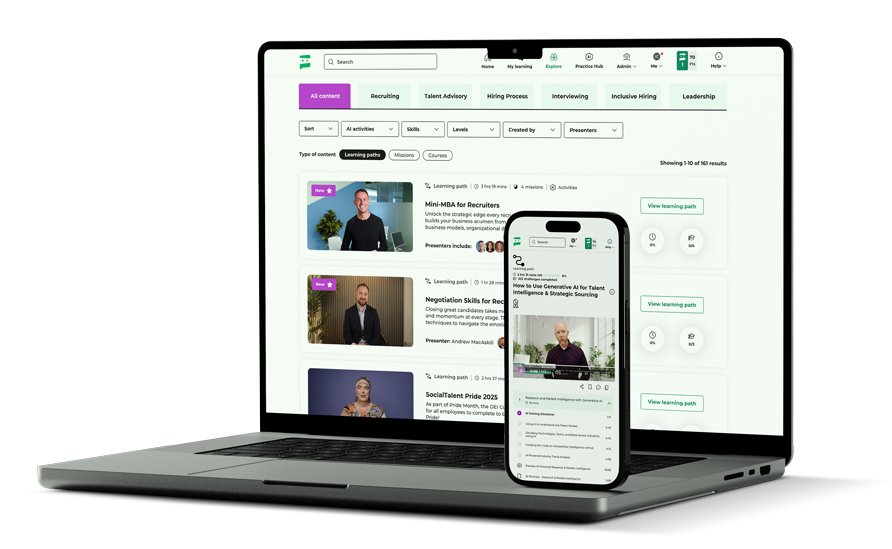
By David Deady
Given how changeable the 2024 market has been already, the significance of quality-of-hire as a pivotal metric for recruiters and talent acquisition professionals has seemingly reached unprecedented heights. With the accelerating pace of technological advancements, shifting economic conditions, and evolving workplace norms, attracting and retaining top-tier talent is not just an operational goal—it’s a strategic imperative that directly impacts an organization’s competitiveness and sustainability.
Quality-of-hire has always been a tricky data point to pin down. But as Lever says, it is the “holy grail” of recruiting metrics! Getting a handle on what quality means to your company and understanding how you can track and prioritize it can truly elevate your recruiting performance (while also warding against any potential bad hires!)

Understanding Quality-of-Hire
Today’s market reality underscores a simple yet profound truth: the caliber of an organization’s talent is the most potent predictor of its success. Quality-of-hire transcends traditional hiring metrics by providing a comprehensive view of a new hire’s impact on an organization, encompassing their performance, cultural fit, and retention potential. In the face of intensified competition for talent and the critical need for agility and innovation, making informed hiring decisions has never been more crucial.
Quality-of-hire is an aggregate metric that evaluates the long-term value new employees bring to an organization. This metric encompasses various dimensions, including job performance, cultural alignment, attrition rates, and their contribution to overall team dynamics. It is not an instantaneous data point like time-to-hire or time-to-interview, given that it can take months to measure the various indicators. However, its multifaceted nature makes it an invaluable tool for gauging the effectiveness of recruitment strategies and refining hiring processes to align with organizational objectives.
Learn more: The Importance of Recruiter Agility
The 2024 Hiring Climate: Challenges and Opportunities
The hiring landscape in 2024 is characterized by several distinct challenges and opportunities. Technological advancements, particularly around AI, have transformed job roles, necessitating a workforce adept at adapting to change and continuously learning. The growing emphasis on diversity, equity, and inclusion (DEI) has made cultural add an essential consideration, while remote and hybrid work arrangements have redefined workplace dynamics.
- Rising Competition for Talent: The demand for skilled professionals in emerging fields such as artificial intelligence, cybersecurity, and sustainable energy is outpacing the supply. This talent shortage has heightened the importance of not just attracting but also retaining high-quality hires.
- The DEI Imperative: Organizations are increasingly recognizing the value of a diverse workforce in driving innovation and reflecting the global marketplace. Integrating DEI considerations into the quality-of-hire metric ensures recruitment processes are equitable and inclusive, attracting a broader range of candidates.
- The Remote Work Revolution: The widespread adoption of remote and hybrid work models has expanded talent pools, enabling organizations to attract candidates from across the globe. However, it has also introduced complexities in assessing cultural add and fostering team cohesion, making quality-of-hire an even more critical metric.
Learn more: Navigating the AI Revolution in Talent Acquisition
Tracking Quality-of-Hire
To harness the full potential of quality-of-hire as a strategic metric, organizations must implement a robust framework for tracking and analysis. This involves identifying key performance indicators (KPIs) that align with organizational goals and using a combination of quantitative and qualitative data to assess the long-term impact of new hires.
Step 1: Define clear performance benchmarks
The first step in tracking quality-of-hire is to establish clear, role-specific performance benchmarks. These can include sales targets, project completion rates, customer satisfaction scores, or any other relevant performance indicators. Having concrete benchmarks helps in objectively evaluating the contribution of new hires to organizational objectives.
Step 2: Measure retention rates
Retention rates are a critical component of quality-of-hire, reflecting not just the ability of new employees to perform their roles but also their alignment with the company culture and their long-term potential. Tracking turnover among new hires within their first year can provide valuable insights into the effectiveness of your recruitment and onboarding processes.
Step 3: Evaluate time-to-productivity
Time-to-productivity measures the duration it takes for new hires to become fully productive members of the team. This metric varies by role and industry but is a key indicator of how well new employees are integrating and adapting to their roles. Shorter ramp-up times are generally indicative of successful hires.
Step 4: Gather 360-degree feedback
Incorporating 360-degree feedback from a variety of sources, including supervisors, peers, direct reports, and, of course, the hiring manager, can provide a comprehensive view of a new hire’s performance and impact. This feedback can cover aspects such as collaboration, leadership, problem-solving ability, and adaptability.
Step 5: Utilize advanced analytics
Advanced analytics and data visualization tools can aggregate and analyze data from various sources, providing insights into trends, potential areas for improvement, and the overall success of recruitment efforts. Predictive analytics can further refine the hiring process by forecasting future performance based on historical data.
Strategies to Enhance Quality-of-Hire
So you know what quality-of-hire is all about, you have an idea about how you track it – so what about enhancing it? Here are a few avenues you can look at to ensure the quality of your new recruits remains high!
- Foster a Strong Employer Brand: A compelling employer brand that resonates with your target talent pool can differentiate your organization in a competitive market. Highlighting your company’s values, culture, and commitment to employee growth can attract candidates who are a good fit.
- Prioritize Candidate Experience: A positive, engaging candidate experience is crucial for attracting top talent. Streamlined application processes, transparent communication, and constructive feedback can enhance your employer brand and increase the likelihood of securing high-quality hires. According to HiBob, organizations that prioritize a strong candidate experience are shown to improve their quality of hires by 70%.
- Implement Structured Interviews: Structured interviews, where each candidate is asked the same set of questions, can reduce bias and ensure a more objective assessment of candidates’ capabilities and fit. This approach contributes to more consistent and reliable hiring decisions.
- Embrace DEI Practices: Incorporating DEI practices into every stage of the recruitment process not only broadens your talent pool but also enriches your organizational culture. A diverse and inclusive work environment is appealing to top talent and can improve retention rates.
- Focus on Onboarding and Development: Quality-of-hire is not solely determined at the point of hire. Effective onboarding and ongoing development opportunities are essential for new hires to reach their full potential. Investing in your employees’ growth signals your commitment to their success, enhancing retention.
Learn more: How to Build the Perfect Candidate Experience
The Competitive Edge of Quality-of-Hire
Laszlo Bock, Co-founder and CEO of Humu and author of “Work Rules,” says that:
“Hiring is the most important people function you have, and most of us aren’t as good at it as we think. Refocusing your resources on hiring better will have a higher return than almost any training program you can develop.“
As we navigate the complexities of the 2024 hiring climate, the importance of quality-of-hire as a key metric for recruiters and talent acquisition professionals cannot be overstated. It embodies a holistic view of talent acquisition, emphasizing not just the skills and qualifications of new hires but their broader impact on an organization’s culture and success.
By adopting a strategic, data-driven approach to recruitment, companies can ensure they attract, retain, and nurture the high-caliber talent that is essential for success this year and beyond.


